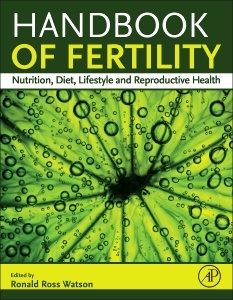Handbook of Fertility Nutrition, Diet, Lifestyle and Reproductive Health
Coordonnateur : Watson Ronald Ross

Handbook of Fertility: Nutrition, Diet, Lifestyle and Reproductive Health focuses on the ways in which food, dietary supplements, and toxic agents, including alcohol and nicotine affect the reproductive health of both women and men.
Researchers in nutrition, diet, epidemiology, and endocrinology will find this comprehensive resource invaluable in their long-term goal of understanding and improving reproductive health.
This book brings together a broad range of experts researching the different aspects of foods and dietary supplements that promote or detract from reproductive health.
Section One contains several overview chapters on fertility, how it is assessed, and how it can be affected by different metabolic states, nutritional habits, dietary supplements, the action of antioxidants, and lifestyle choices. Sections Two and Three consider how male and female fertility are affected by obesity, metabolic syndrome, hormonal imbalance, and even bariatric surgery.
Section Four explores the ways diet, nutrition, and lifestyle support or retard the success of in vitro fertilization, while Section Five explores how alcohol and other drugs of abuse lower fertility in both women and men.
Section A: Overview on Fertility 1. Perceptions of Environmental Risks to Fertility 2. Paternal smoking as a cause for transgenerational damage in the offspring 3. Impact of cigarette smoking during pregnancy on conception and fetal health through serum folate levels 4. The effect of maternal metabolic health and diet on the follicular fluid composition and potential consequences for oocyte and embryo quality 5. The effect of Heavy Metals on preterm mortality and morbidity 6. Nitrate, Nitrite, Nitrosatable Drugs, and Congenital Malformations 7. The Application of Reproductive Techniques (ART): worldwide epidemiology phenomenon and treatment outcomes 8. The effect of environmental hormone disrupters on infertility, strategy to reverse their impact 9. Embryo losses during nutritional treatments in animal models: lessons for humans
Section B: Bariatric Surgery, Obesity and fertility 10. Fertility and testosterone improvement in male patients after bariatric surgery 11. Obesity and reproductive dysfunction in men and women 12. Obesity on gestational outcomes Section C: Exercise and Lifestyle in Fertility 13. Lifestyle factors and reproductive health 14. Effect of diet and physical activity of farm animals on their health and reproductive performance 15. Prenatal physical activity and gestational weight gain 16. Lifestyle intervention for resumption of ovulation in anovulatory women with obesity and infertility 17. Effects of lifestyle on female reproductivefeatures and success: lessons from animal models Section D: Nutrition and Reproduction 18. Green Leafy Vegetables: A Health Promoting Source 19. Nutrition lifestyle and obesity in urology 20. Pregnancy with multiple micronutrients: perinatal mortality reduction 21. Nutrition and Hormones: Role in male infertility 22. Nutritional and developmental programming of the Central Nervous System (CNS) 23. Herbal supplements in pregnancy:effects on conception and delivery 24. Selenium in fertility and reproduction 25. The role of oxidative stress in Endometriosis 26. Oxidative stress and pre-eclampsia Section E: Nutrition and Lifestyle in in-vitro Fertilization 27. The psychological management of infertility 28. The role of body mass index on assisted reproductive treatment outcome 29. Health outcomes of Children Conceived through Assisted Reproductive Technology 30. Influence Of Male Hyperinsulinaemia On IVF Outcome Section F: Nutrition, Lifestyle and Male Fertility 31. Dietary zinc deficiency & testicular apoptosis 32. Environmental factors, food intake and social habits in male patients and its relationship to intracytoplasmic sperm injection outcomes 33. The role of over-the-counter supplements for the treatment of male infertility 34. Sperm physiology and assessment of spermatogenesis kinetics in vivo 35. Antioxidant treatment and prevention of human sperm DNA fragmentation: Role in health and fertility 36. Epigenetics and its role in male infertility
- Explores how alcohol, nicotine, and other drugs of abuse disrupt and impair reproductive health
- Reviews studies of common conditions such as obesity and metabolic syndrome and their effect on fertility and reproductive health
- Investigates the components of foods and dietary supplements, in particular oxidative stress and antioxidants
- Presents the nutritional effects of foods and dietary supplements and their benefits and risks relating to reproductive health
Date de parution : 04-2015
Ouvrage de 452 p.
21.4x27.6 cm
Thèmes de Handbook of Fertility :
Mots-clés :
adverse gestational outcomes; androgens; animal models; anovulation; antimicrobial; antioxidant; antioxidants; apoptotic genes; arsenic; ART; assisted reproductive technologies; assisted reproductive treatment; asthenospermia; bariatric surgery; behavior modification; body mass index; brain; cadmium; cancer; cardiovascular disease; cattle; CMA3; congenital malformation; cytokines; data collection; Diet; DNA methylation; embryo; embryo quality; endocrine disruptor; endocrine-disruptors; endometriosis; environment; environmental factors; epididymis; epigenetics; exercise; farm animals; female infertility; female obesity; female-reproduction; fertility; folate; folic acid; follicular fluid; food intake; food supplement; framework; free radical species; genes; genitourinary; germ cell mutagen; gestational diabetes; gestational weight gain; health benefits; heath status; heavy metals; herbal remedies; herbal supplements; histones; hormone; hypertension; ICSI; in vitro fertilization; infertility; iron; IVF; IVF outcome; lead; leafy vegetables; lifestyle; lifestyle factors; long-term outcome; male; male fertility; male hyperinsulinemia; male infertility; male obesity; males; maternal health; maternal-fetal distress; mercury; metabolic hormones; oocyte; metabolic risk; metabolism; metformin; micronutrient; mother; multiple micronutrients; neurodegeneration; neurological disorders; newborn; nitrate; nitric oxide; nitrite; nitrosatable drug; nutraceutical; nutrition; obese; obesity



